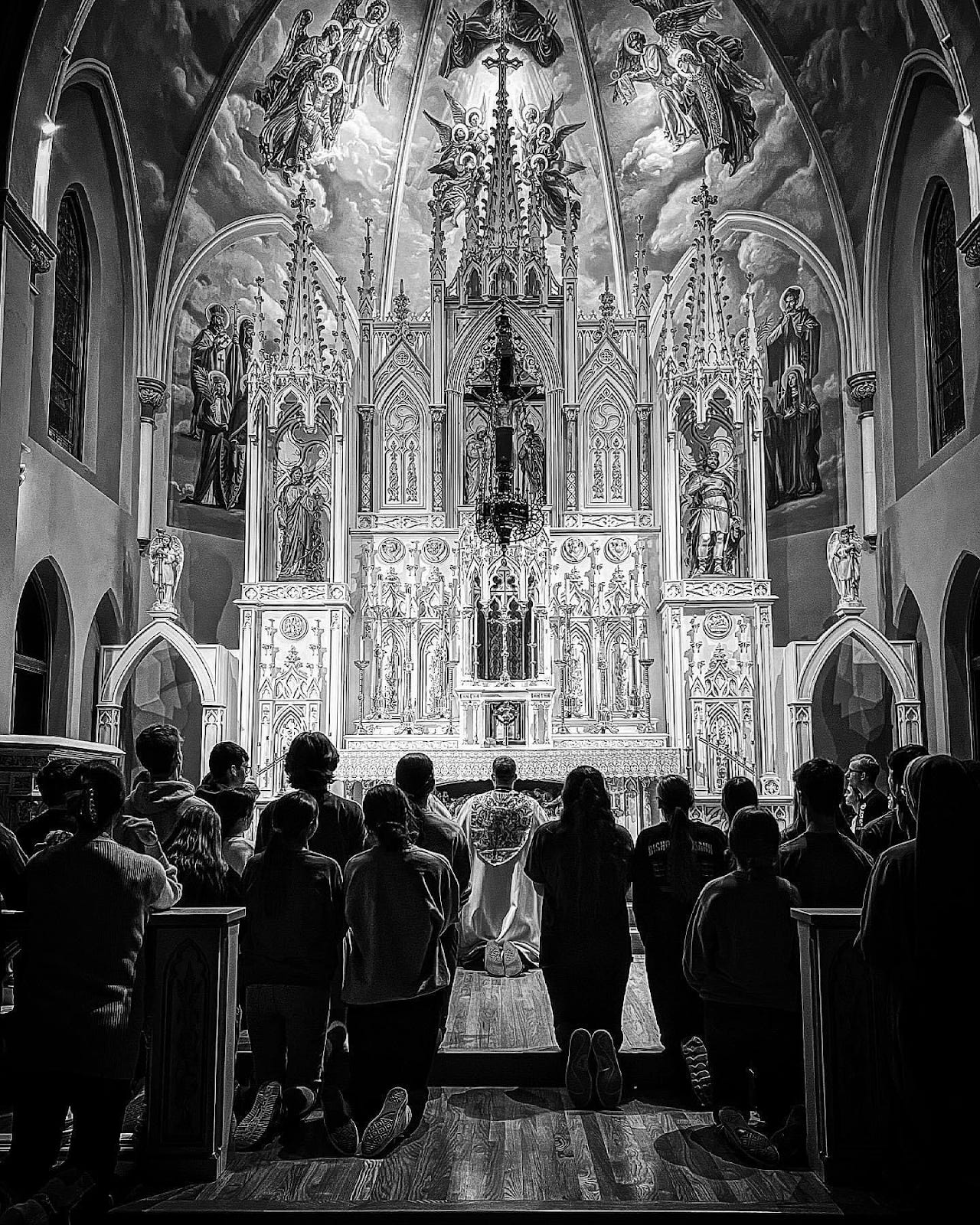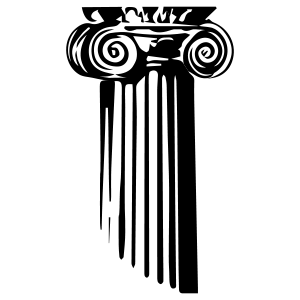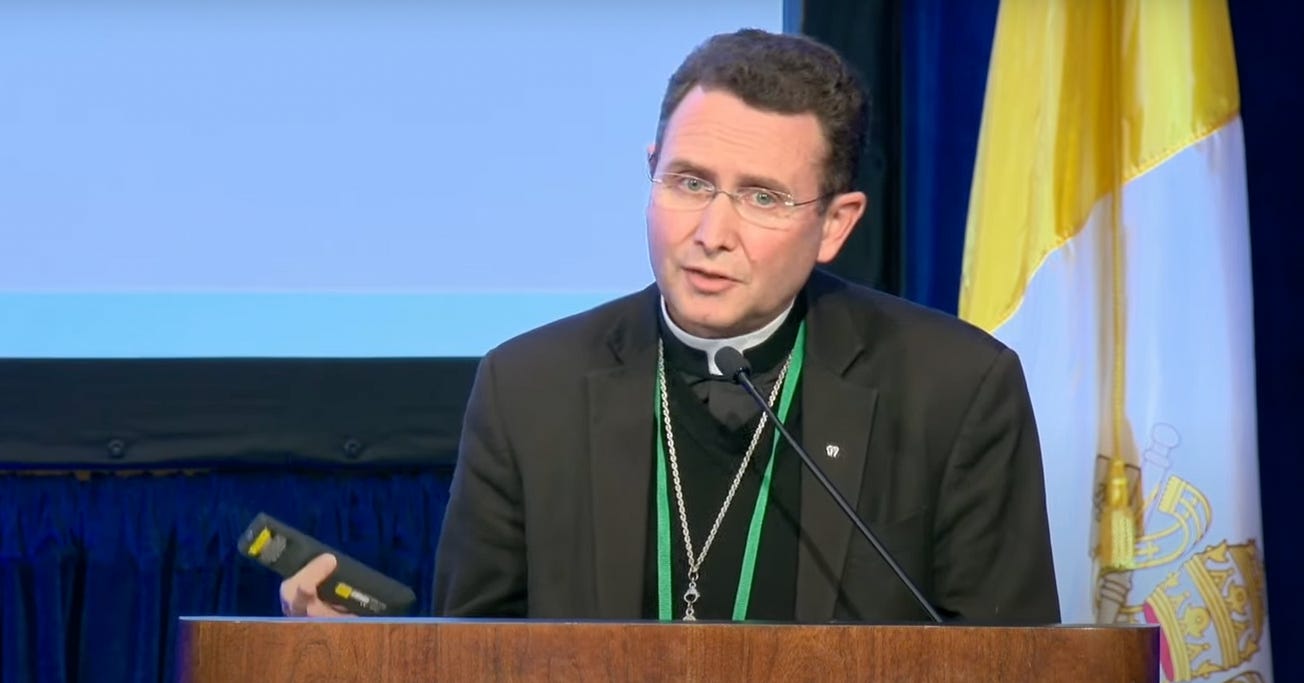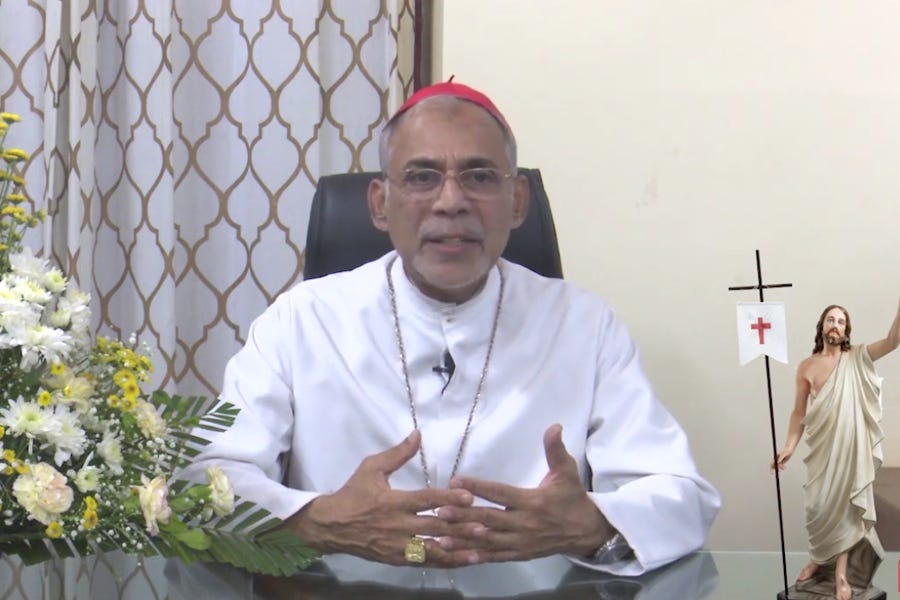Hey everybody,
Today is 2-22-22, and you’re reading The Tuesday Pillar Post.
Actually, if you use the date/month/year date system, today is 22-02-2022, a completely palindromic date. The date is also an ambigram, meaning it reads the same upside down and right-side up, at least if you’re using the right font.
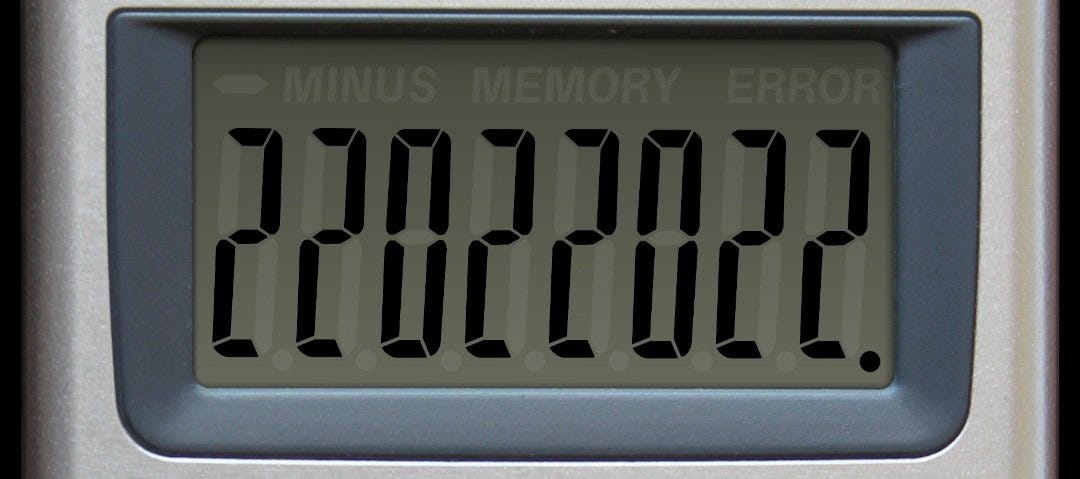
So if you need a little trivia to get you through the day, now you have that. Don’t say I never give you anything.
The news
After months of playing footsie with the idea, Russian president Vladimir Putin yesterday reinvigorated his country’s invasion of Ukraine, ordering troops into the parts of eastern Ukraine which have been since 2014 styled as “breakaway” or “autonomous” regions, with Russian support.
Russia said on Sunday that those regions were part of Ukraine, but on Monday said instead they are legitimate and independent states in need of Russian military peacekeeping forces, which Putin commanded over the border.
There is some quibbling over whether this can be called an “invasion” since, after all, Russia has been backing the self-declared separatist governments in those Ukrainian regions for seven years.
You know all of that, because you could read it in any newspaper in the world.
But you won’t read anywhere but here what that has to do with a 400-year-old Catholic question: When the pope might recognize an eastern Catholic patriarch in Kyiv.
It’s a question being considered at the Vatican right now.
You can only read that at The Pillar, and I bet you’ll find it fascinating. I sure did, when I talked to a Ukrainian Church historian about why the Ukrainian Greek Catholic Church doesn’t have a patriarch, what that means, and whether things might soon change.
“It is essential for our faithful scattered around the world to have a spiritual and visible connection with the center of the Church in Kyiv. It would be natural for our tradition for the head of such a global community to have the title of patriarch,” historian Anatolii Babynskyi told me from Lviv.
So why hasn’t it happened yet? Politics, mostly. And from Babynskyi’s perspective, the contemporary politics have a lot to do with Moscow:
“The Russian Federation and the Moscow Patriarchate consider Ukraine their ‘backyard’ where every Eastern Christian should be Russian — that's why Mr. Putin says that Ukrainians and Russians are one people — and belong to the Moscow Patriarchate….Thus, the ecumenical dialogue between the Vatican and Moscow became a hostage to the Russian neo-imperialism.”
“As long as the Moscow Patriarchate is a tool of Russia's state policy, it will be fruitless to try to convince the Moscow Patriarchate that the Greek Catholic Patriarchate in Ukraine is in no way a threat to the ecumenical dialogue.”
Read this fascinating historical and contemporary story right here.
—
Cardinal Angelo Becciu was in the Vatican City’s court on Friday, asking to have the criminal charges against him dismissed.
Becciu, who until recently had professed absolute loyalty to Pope Francis, now says the case should be dismissed because the pope inappropriately dispensed prosecutors from observing some elements of Vatican criminal procedural laws, and actually changed some procedural laws while Becciu was already being investigated.
A judge is expected to rule on the dismissal motion Feb. 28. You can read about it here — plus the newly emerged story of 100,000 euro Becciu arranged for a Vatican bank to transfer into the personal account of his brother. While the cardinal says that was a legitimate loan, the bank’s director resigned a week after the transfer took place, while facing his own set of massive criminal misconduct charges — he was later convicted and ordered to repay some 40 million euros to the bank.
How about all that, huh? Check it out.
—
We reported last week about a bunch of small changes Pope Francis made to the Church’s universal Code of Canon Law. Some had to do with religious law, some with finances, some with catechesis — they were a real grab bag.
The Apostolic See says that the changes all are about “healthy decentralization” and subsidiarity.
But Ed noticed something else: Most of the changes eliminate or simplify time-consuming and costly Vatican review processes. With the Vatican in a cash crunch, and tightening belts in all departments, he asks whether the simplest answer isn’t that the changes save the Roman curia money.
Journalists know that the simplest way to understand most stories is to try and follow the money — the Wu-Tang Clan adage “Cash Rules Everything Around Me” comes to mind. That may, in fact, be key to understanding this story.
—
Archbishop Joseph Kurtz has been a priest for nearly 50 years, and a bishop for more than two decades. He’s been president of the U.S. bishops’ conference, and was tapped last year to preach, at a critical moment, to a fractious and divided USCCB. He also has an experience close to my own heart: The archbishop says that no one has touched or influenced his life more than his older brother George, who had Down syndrome.
As he prepares for his March 30 retirement, I sat down with Archbishop Kurtz for a conversation looking back at his priestly ministry, and looking ahead to what’s next in his life.
You can listen to our conversation here, in a bonus episode of The Pillar Podcast.
Pope Francis gave the Priestly Fraternity of St. Peter a decree this month which established that many of his 2021 restrictions on the Extraordinary Form of the Mass don’t apply to them. This means, effectively, that however the pope’s restrictions, Traditionis custodes, are implemented in dioceses around the world, the chapels, churches, and oratories of the FSSP can mostly continue to operate as they always have, including by offering public Masses.
And you might be wondering why exactly this happened. Well, back when the Vatican clarified papal reforms in December 2021, we explained that the clarifications didn’t apply to religious institutes — in fact, there’s a specific clause of Traditionis custodes which delineates that. But not all bishops must have caught that explanation, because a number of them have tried to impose restrictions on the FSSP beyond the limits of their competence. The decree issued by the pope this month seems designed to sort all that out.
There might, though, be another reality in play. Since Traditionis custodes was promulgated in July 2021, it’s been clearly a divisive issue, and the discontentment of traditionalist Catholics has not quelled. Meanwhile, sources in the Society of St. Pius X, a traditionalist group in “imperfect communion” with the Catholic Church, tell me that in some places attendance at their chapels is through the roof.
This is not an ideal situation, from the Vatican’s perspective.
While the Vatican doesn’t call the SSPX schismatic, the group is in “imperfect communion,” and doesn’t consider itself bound to the ordinary governing structures of the Catholic Church. It argues that a “pastoral emergency” of ecclesial dysfunction in and after Vatican II allows it a “supplied jurisdiction” to act outside of ordinary and practical communion with local bishops or the pope.
Now, nearly all theologians and canon lawyers will tell you that’s simply not true. But the SSPX, which doesn’t accept even all canons of the Code of Canon Law, was never going to accept Traditionis custodes — which means that despite the pope’s intentions for liturgical unity, the Extraordinary Form of the Mass was going to remain available to those who really wanted it. But it also means that some people who were attending Masses in ordinary and regular communion with their diocesan bishop and with the pope are now attending SSPX Masses — a situation not ideal from the perspective of ecclesial communion, a basic obligation of the Christian life.
It’s at least worth considering whether expanded clarity about the status of the Priestly Fraternity of St. Peter — something of a rebuke to the most extreme interpretations of Traditionis custodes — isn’t at least partially out of concern to those Catholics who would attend the Extraordinary Form no matter where it was offered, and by that fact, might be led into error, and out of communion with the Church.
There’d be a sense of coming full-circle if that were the case, since similar concerns are part of the reason the FSSP got started in the first place.
A dad moment
I don’t have an especially poignant cultural or ecclesiastical commentary for you this morning, so I’ll offer you a slice of life, at least.
Our kids have been trading head colds over the past few weeks, as kids in wintertime tend to do, and Mrs. Flynn has been the tip of the spear in terms of bringing them soup and tolerating their cold-induced whininess.
So it was perhaps inevitable that she would pick up the cold, and begin to feel congested, a bit feverish, and scratchy-throated herself, as she did late last week. But in the manner of moms everywhere, she was determined not to let ill-health slow her down, and so she kept on doing all the things she usually does, plus tending to whiny sick kids, and trying to nurse her own cold.
By Sunday, Mrs. Flynn was exhausted, a bit feverish, and her throat felt like fire — she was clearly in need of a day of rest, in bed alone, with the door closed and kids otherwise occupied. So I told her the kids were no problem, that I hoped she’d rest well, and that I’d bring her some tea.
Most of the day went pretty well. The kids were feeling sick, and were kind of whiny, but I was glad for a day of doing crafts, and venturing outside for a while, and even trying to convince them to help me with a few basic chores. Like a lot of dads, though, when I spend a single day doing exactly what my wife does every day, I run out of steam by about 4:30. That’s also the time when kids run out of obedience.
So by dinner time, things had gotten pretty chaotic downstairs. Mrs. Flynn had graciously invited one of the whiniest children to rest with her in bed for a while, but by 5:30 he was back downstairs. I was trying to get some dinner on the table, which only really involved heating up and plating various kinds of leftovers, while I also found myself intervening in the bickering about who hit whom or why So-and-So didn’t play fair.
Ordinary domestic church stuff, for the most part. But while I had prided myself on keeping the television off for most of the day — and was actually feeling a little bit self-righteous about it — eventually I promised those kids that if they just behaved, apologized to each other, and cleaned up some toys, everyone could watch some cartoons for a while.
Except while I was sorting all that out, I started to notice a very bad smell in the kitchen. It smelled like I had put a plastic utensil on a stove burner or left something weird in the oven. I wanted to investigate it, and couldn’t find the problem. The kids, and their many, many needs, were interfering with my investigation.
So I made a little plan: I’d put on the television, park them on the couch, investigate the terrible smell, and then put dinner on the table. Except I couldn’t find the TV remote. I dispatched everyone to start looking for it — under the couch, between the cushions, on the bookshelf, in the toy boxes, in our jacket pockets — anywhere I could think.
They whined while they looked, and I realized I needed to put some food in their stomachs. I called an audible, and went to take some leftover potstickers out of the microwave. And there I found the remote control. Sitting right in the microwave where I had left it —before I nuked those potstickers. And I found the source of that terrible smell: the back of the remote control, smoking, and melted, and laughing at me.
The lesson, if you’re curious, is that if you microwave a television remote control, it won’t work anymore. And so if you promised the kids some cartoons, and they haven’t eaten, you might find a rebellion on your hands. There will be weeping and gnashing of teeth. And then, miraculously, Mrs. Flynn will gently offer a life-raft, taking command of the children, setting all things to right, and reminding you that mothers are graced, skilled, and gifted in ways that no one else can possibly emulate. That’s why dads are so crazy about them.
The Bishops Fabre
Appointed Bishop of Charleston, South Carolina, today is Bishop-elect Jacques Fabre, a Haitian priest of the Scalabrinian religious order, who speaks five languages and has a fascinating set of missionary experiences from which to draw. The bishop-elect is the second Fabre to be appointed to lead a diocese this month — Bishop Shelton Fabre (no relation) was appointed Archbishop of Louisville Feb. 8.
My friend Christine Rousselle points out that the Bishops Fabre will constitute one of several same-name episcopal pairings in the Church:
Christine noted two +Clarks, three +O’Connells, three +Brennans, two +Garcias, three +Walshes, two +Fischers, two +Campbells, two +Malones, two +Thomases, two +Dolans, two +Tobins, two +Williamses, two +Rodriguezes, and two +Parkes — although those Parkes guys are actually brothers.
Like I said, if you’re in need of trivia, today’s Pillar Post is the place to come.
Deo gratias
Today is the feast of the Chair of St. Peter, in which we remember the gift of the papacy, a central principle of unity and continuity in the life of the Church. May we pray for Pope Francis today, and pray both for the intercession of his sainted predecessors, and for the repose of the souls of those popes of history who were not saintly, and now covet our prayers in purgatory.
—
Be assured of our prayers, and thanks for your support. We keep The Pillar in business with your subscriptions, so thanks to subscribers, please consider it if you don’t subscribe, and please consider sharing The Pillar with someone who might like reading it just as much as you do.
Like I said, we’re praying for you. Please keep praying for us. We need it.
Finally, a friend of mine sent me this photo of prayer during a TEC (teens encounter Christ) retreat at the newly renovated St. Wenceslaus Parish in Wahoo, Nebraska. I’ve got no comment on it, except that it’s beautiful, and I hoped you’ll be moved by it:
Yours in Christ,
JD Flynn
editor-in-chief
The Pillar

